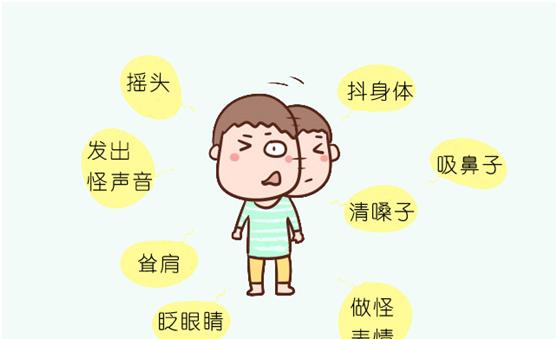As the children grew up day by day, the previous cute painting style suddenly began to change, and the children actually made a "strange appearance":
Frequent blinking, squeezing eyebrows, facial twitching, shruging of the nose...
If the children in the family have the above problems, then parents must be careful, because the children may suffer from a disease called "tics"!
What is tics?
In recent years, the incidence of childhood tics has increased year by year, which has seriously affected children's learning and life.
Tics are a group of syndromes that begin in childhood or adolescence and are characterized by involuntary, repetitive, and rapid motor twitches and/or vocal tics at one or more sites.

There are usually three types of:
Transient tic disorders
Chronic motor or vocal tic disorders
Vocalizations are associated with a variety of motor tic disorders (Tourette's syndrome, Tourette syndrome).
The incidence of tics is between 2-12 years old, with more boys than girls. Tics are mostly aggravated during mental tension, fatigue, and colds, lessen when concentration and emotions are stable, disappear after falling asleep, can be relieved or aggravated by themselves, and the symptoms of tics are repeated and varied. In addition, transient tic disorder does not affect the physical and intellectual development of children, so parents should not worry too much.
At present, the cause of tic disorder is not fully understood, which may be the result of the interaction of genetic factors, neurophysiology, neurobiochemical, psychosocial factors and environmental factors. In particular, it is necessary to pay attention to strong mental trauma, excessive discipline, scolding, excessive mental tension, and excessive learning pressure, which can easily induce tic disorders.
What are the symptoms of tics?
Tic disorders are complex and varied, and can manifest as tics in any part of the body or a combination of multi-site tics.
Complex movements such as blinking, shaking your head, facial twitching, mouth shrugging, nose shrugging, mouth opening, shoulder shrugging, arms raising, kicking legs, bulging your stomach, twisting your waist, etc., may also be clearing your throat, making sounds in your throat, swearing, or even manifesting as chronic cough.
Parents in the exclusion of a single situation, if the child concentrated on the above several situations, parents should be careful!
In addition, if parents find that children just blink frequently, don't worry, first see if these situations are caused.
1. Excessive use of electronic products
Now children are smarter than one, mobile phones and tablets play more slippery than adults, some parents neglect to manage their children's play time, which will also lead to many children's dry eyes and frequent blinking.
2. Eye diseases
The more common eye disease is conjunctivitis, because children usually like to touch the east and west, from time to time also rub their eyes, at this time a large number of bacteria on the hands are easy to take advantage of the weakness to lead to conjunctivitis, resulting in eye discomfort.
3. Foreign body enters the eye
When children play outdoors, foreign bodies such as sand dust, flying feathers, eyelashes and other foreign objects accidentally fall into the eyes, which will also cause children to blink frequently, and parents should also pay attention to Oh.
What are the effects of tics on children?
1. Influence learning and life
Some children have performances such as clearing their throat, making sounds in the throat, and severe tics in class because of tic disorders, which will affect the teacher's class and affect other students, resulting in the inability to complete the classroom learning.
2. Prone to psychological problems
Children will find that they are different from other children, and may be ridiculed by classmates because of tic symptoms, which will affect mental health for a long time, lead to inferiority complex, and even severe depression, anxiety and so on.
What should I do if I have tics?
First of all, if the child suffers from tics, parents must take the child to the hospital as soon as possible to seek the help of a doctor.
Secondly, in daily life, parents should remember not to blame children, tics is a disease, children's abnormal behavior is not their intention, parents should give children more understanding and tolerance, more care for children's inner feelings, give children enough respect, do not scold, avoid verbal cues, minimize children's sense of stress and tension.
Everyone's childhood should have the brightest color, but for children with tic disorder, the beginning of this life is some indescribably heavy, helping children get out of the "hidden corner" and regain happy times!